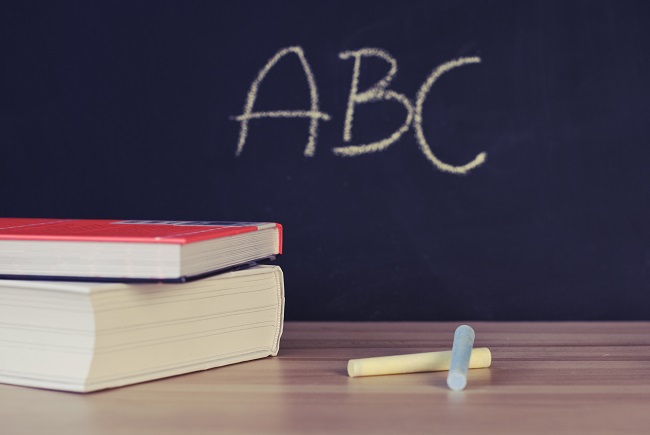 Some folks view life with a scorecard. On one side of the scorecard, they have their successes. On the other side, they have their failures. And at the end of the “game,” they hope that they will have tallied more successes than failures. The Scorecard Approach is an inaccurate way to view life. And it leaves a lot of people feeling badly about themselves, if they haven’t done everything in life perfectly.
Some folks view life with a scorecard. On one side of the scorecard, they have their successes. On the other side, they have their failures. And at the end of the “game,” they hope that they will have tallied more successes than failures. The Scorecard Approach is an inaccurate way to view life. And it leaves a lot of people feeling badly about themselves, if they haven’t done everything in life perfectly.
The better approach is to view life like a class. The point of life is to continually learn. So, every experience is a test. And passing the test doesn’t involve performing perfectly. Rather, it involves learning perfectly. Did I learn something from the experience? Did I gain some knowledge from the experience that will make me a kinder or more compassionate person?
The goal of The Class of Life is that at the end of your life, you will be a far wiser person than when you started. So, during each decade of your life, you should be growing in emotional maturity. For instance, I am not the same person that I was in my twenties. In my twenties, I lacked confidence. Of course, that was silly. Looking back, I was an attractive and intelligent young woman. But in my twenties, I was quick to feel insecure. The smallest insult could undermine my self-esteem.
Thirty years later, I no longer lack confidence. And that comes from many years of being a capable person. And it comes from realizing that there is no one who has better judgment about my life than I do. And it comes from discovering that those people in my life who claimed that they knew better than me, simply did not. So, my confidence has been hard-earned.
The challenge of life is that we aren’t immediately wise the moment that we turn 18. As a result, the decisions that we make in your 20s are not likely to be the decisions that we would make in your 40s and 50s. For example, the people we choose to marry in our 20s may not be the people we would choose to marry later on in life, after we’ve matured and gotten to know ourselves better.
Similarly, the career that we choose in our 20s may not satisfy us in our 40s, after we’ve gained a better understanding of our professional passions. At 25 we may choose a career because it “sounds good.” However, later on, we may come to realize that our career isn’t at all that we thought it would be.
For instance, I chose to pursue a career in the law when I was in my 20s. It wasn’t a terrible choice. The law has provided me with intellectually stimulating work for a number of decades. But it certainly doesn’t reflect where my professional passions lie. However, when I was in my 20s, I didn’t know myself. And I wasn’t confident in my own judgment. So, I allowed others to influence me to choose a profession that didn’t truly match my personality.
But I don’t view my choice to go to law school as a mistake. In the class of life, there are no mistakes. Only learning experiences. And I’ve learned a lot through my career. I’ve learned to present myself professionally and confidently. I’ve learned to think quickly on my feet. And interestingly, I’ve learned that the clearest thinkers are typically the quiet ones in the room, not the noisy ones.
Even “failed” relationships aren’t truly failures. They rather are opportunities to better understand other people, and more importantly, to better understand ourselves. In fact, in every failed relationship that I’ve had, I’ve learned a little bit more about myself.
For instance, I have always believed in the bible verse, “Blessed are the peacemakers.” As a result, in the past, when people in my life did profoundly stupid things or behaved in a difficult manner, I tended to forgive them and tried to “understand” them. However, I am no longer that magnanimous, and I don’t suffer fools gladly.
Of course, I still subscribe to the importance of being a peacemaker, and I don’t relish conflict. But I do believe that if people want to be stupid and difficult, they don’t need to be part of my world. Another lesson from The Class of Life.
In fact, I would argue that there are no failures in life. Mistakes are necessary. You cannot learn about the nature of other people if you don’t have some relationship mistakes. You cannot learn about who you are – your likes, dislikes and innate passions – unless you try different things.
The only real failure in life is the failure to learn. The people who fail to learn are easy to spot. They are arrogant and conceited, when they should be humble. They try to undermine the confidence of others, instead of building people up. Instead of being helpful, they wonder why others aren’t doing more for them.
So, when you consider your life, don’t view it in terms of a tally of success and failures. Think of it as a class and judge your progress accordingly. Each year, have you learned something? Have you improved as a human being? Have you become smarter, kinder and more compassionate? Those are the only achievements that truly matter in The Class of Life.
(Photo Courtesy of Pexels)
Email: yourmorningcupofinspiration@gmail.com
Books: “The Secrets to Success for the Working Mother” by Meerabelle Dey (https://www.amazon.com/Secrets-Success-Working-Mother/dp/1546329544 )

